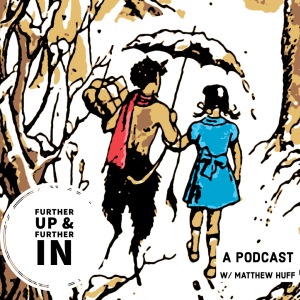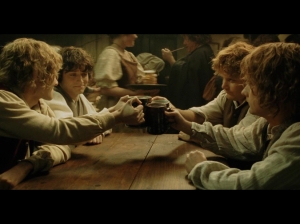So, here we go.
As Eden.Babel has been revamped and reorganized from its previous blog-manifestation, I’d like the inaugural post to throw back to an article I wrote over a year ago in which I first discuss our cultural and corporate depravity as a new Babel, institutionalized and broadly congratulated by its citizens. For Christians living in this age, however, we must have our eyes fixed on the glimpses and shadows of a new-and-greater Eden, the promised land where the lion will lie with the lamb and the Lord will rule the nations. We must remember that every knee will bow. As Mark Lowry once quipped, “The question is not whether or not you will acknowledge that Jesus is Lord, but when will you.”
We must engage wholeheartedly with this world; we must read its literature, hear its songs, observe its trends. We must be cultural reformers. We must live in Babel, but long for Eden…
God gave us Eden; we built Babel.
So begins the story of human history. In Genesis 2 and 3 we read of God’s creation of Eden, and our hearts weep for the loss. Though many of us rarely (I would imagine) consciously mourn our lost home, nothing informs our existences more. Our daily struggles, our joys, our griefs, our pains, our pleasures are all viewed through the cracked lenses of our exiled state.
In Genesis 2 God created man, and man needed a place to call home:
“Then the LORD God formed the man of dust from the ground and breathed into his nostrils the breath of life, and the man became a living creature. And the LORD God planted a garden in Eden, in the east, and there he put the man whom he had formed.”
Notice that God breathed through dust to make man and, upon breath one, went to work to build a home for us. God designed Eden for man. We must not miss the intentionality and the purpose of this grand garden. All good art (and yes, there is “good” art and “bad” art) reveals a deliberateness, an intentionality. God so loved man, on purpose, as to create an ideal, beautiful paradise for him, and therein “to put the man whom he had formed.” No ruse, no gimmick, no tricks. God laid Adam in the center of Eden as if to say, “I love you and want you to have all of this.” Eden was God’s first surprise gift for mankind. God crafted a masterpiece for undeserving, unlearned man seconds after his making and gave it over unreservedly. Our debt of gratitude to a loving God has gone strong ever since.
God lavished Eden upon man:
“And out of the ground, the LORD God made to spring up every tree that is pleasant to the sight and good for food.”
Eden was a brilliant display, an art form itself, the epicenter of loveliness and virtue. In Eden God surrounded Adam with an abundance of both aesthetic value (“pleasant to the sight”) and practical value (“good for food”). And, if that were not enough, God caused all this value, all this beauty, to spring up from the ground, a geyser of brilliant trees and fruits in a dazzling, miraculous kaleidoscope of creation. Wherever Adam looked, he saw God’s grandeur shooting up from the same dirt which formed his own bones and skin, blood and lungs.
At the heart of this wonder stands God’s first words to Adam:
“You may surely eat […]”
Adam, showered in God’s unbelievable abundance and joining God in unbroken companionship for all eternity, knew the intention of Eden. But God wasn’t through. Atop all of God’s unknowable love in Eden, God fashioned Eve, the “helper suitable for man,” and Adam was finally home. The beauty of Eden’s acreage, the love of a kind woman, all needs afforded, all hungers satisfied, all desires met in full, and all of God all the time. All of life was meant to be all-lived in all of Eden.
But man was a prideful beast, longing for the minds of gods, and he fell. Selling Eden for pretty words from a silver tongue, man traded God’s gift for the stuff of earth. From dust to Eden, Eden back to dust.
Generations pass, and man is steeped in sin. Evil is the order of the day. In Genesis 11 the full gulf between God and man is imaged in the colossus of Babel:
“And they said to one another, ‘Come, let us make bricks, and burn them thoroughly.’ And they had brick for stone, and tar for mortar. Then they said, ‘Come, let us build ourselves a city and a tower with its top in the heavens, and let us make a name for ourselves […]”
Notice the Creation language borrowed from Gen. 1:26 “Let us make man in Our image, after Our likeness.” The parallel is distressing; as God’s display of His own image is man, man’s display of his own image is a tower of brick and tar. God builds a tower of dirt and calls it man; man builds a tower of dirt and calls himself god.
Nowhere in Genesis 11 does the Bible mention any attempt of man’s to “reach God” through the building of Babel. They simply built for themselves a great city and a tower “with its top in the heavens.” Their intention is unmistakable: “let us make a name for ourselves.” Let us build our own Eden, exchanging the breath of God for the smell of tar, the coolness of the day for the hot clay of a thousand bricks. Let us exist not in humility to God but in the pride of our own hands.
If I could summarize all of human history in one statement, I would say, “God gave us Eden; we built Babel.” God gave us all things richly to enjoy, and we threw (and continue to throw) everything away. With one hand we stack our pile of bricks to the sky, with the other we shake a fist at the sky. We sell God and Eden for the trifles of Earth and are angry at God for the suffering in the world?
Every corner of this world echoes the hallowed ground of Eden. All of this world, whether it knows or not, is a reaching back. All of this world is a longing for homecoming. All of this world, though feeding at the prodigal trough, yearns to come home to Eden and the Father. Any height of pleasure, any happiness, any beauty the world hands us is a warped, corrupted photograph of Eden. The world knows the language of Eden but only the words and no meanings. When Hollywood undresses and beckons us to the bedroom, it speaks the words but with no substance. One may know every word in English, but without meaning, he knows nothing; it is merely gibberish. When we gaze at stars, rock peacefully in oceans, stare into the greatness of Grand Canyons, we hear the language of God, but the meaning is lost. It is no wonder Babel became the confusion of languages; when we exchanged God’s garden for our own towers, we gave back the definitions but kept the words.

 A little over a year ago, I wrote a
A little over a year ago, I wrote a  When Snow White arrives at the dwarves’ cottage, we see a warm and inviting portrayal of Eden: there are chores and tasks to be done (to the blissful tunes of whistling while you work, of course), there is community and fellowship, and the cottage is alive with song and dance. Merriment abounds. The story presents this way of life as a perfect balance of duty and desire; each person has a role to fill, and he or she fills it gladly. Sneezy is the one who sneezes, Happy is the one who is happy, Grumpy is the one who is grumpy, and so on.
When Snow White arrives at the dwarves’ cottage, we see a warm and inviting portrayal of Eden: there are chores and tasks to be done (to the blissful tunes of whistling while you work, of course), there is community and fellowship, and the cottage is alive with song and dance. Merriment abounds. The story presents this way of life as a perfect balance of duty and desire; each person has a role to fill, and he or she fills it gladly. Sneezy is the one who sneezes, Happy is the one who is happy, Grumpy is the one who is grumpy, and so on.
 Edenic paradise, God’s story tells us, is subject to the rebellion of man. It was only a matter of time before Snow White would face the choice to fall from the warmth and glory of her perfect home. And fall she does as she fills her mouth with the false deliciousness of the Queen’s poisoned apple and succumbs to the deep sleep of death. Yet, this sleeping death is no individual affair; the effects of her sin are not limited to her lifeless body. Indeed, all of nature is bent by her fall, and when the dwarves encase the body of Snow White in the glass coffin, all of creation attends to mourn the death of Beauty. It is a truly eerie scene in the film; Snow White lies beneath the numb sheet of sin and death, quiet and still, as her dwarves weep softly around her and all of the woodland creatures draw near to see and to mourn. In their sorrow, they know that ultimate Beauty has died and their perfect world has been damaged by darkness and evil. All of creation feels the sting.
Edenic paradise, God’s story tells us, is subject to the rebellion of man. It was only a matter of time before Snow White would face the choice to fall from the warmth and glory of her perfect home. And fall she does as she fills her mouth with the false deliciousness of the Queen’s poisoned apple and succumbs to the deep sleep of death. Yet, this sleeping death is no individual affair; the effects of her sin are not limited to her lifeless body. Indeed, all of nature is bent by her fall, and when the dwarves encase the body of Snow White in the glass coffin, all of creation attends to mourn the death of Beauty. It is a truly eerie scene in the film; Snow White lies beneath the numb sheet of sin and death, quiet and still, as her dwarves weep softly around her and all of the woodland creatures draw near to see and to mourn. In their sorrow, they know that ultimate Beauty has died and their perfect world has been damaged by darkness and evil. All of creation feels the sting.

 In an age of rampant cynicism, intense narcissism, and deep defiance toward absolutes such as truth, goodness, and beauty, the ache for passionate and rich festivity must burn ever more feverishly in our hearts. This sour world, lost in the mirrors of its vanity and drowning in the white noise of feeds, posts, snaps, and late-night binges, is in dire need of a good feast, what Tolkien saw as an evening by the fire, filled with boisterous laughter and great dancing. Or, as Lewis saw, what greater way to herald the breaking of winter than the carousing of creatures at the coming of spring? The promise of resurrection is a great promise, full and strong, breaking like the tide against this screen-drunk land.
In an age of rampant cynicism, intense narcissism, and deep defiance toward absolutes such as truth, goodness, and beauty, the ache for passionate and rich festivity must burn ever more feverishly in our hearts. This sour world, lost in the mirrors of its vanity and drowning in the white noise of feeds, posts, snaps, and late-night binges, is in dire need of a good feast, what Tolkien saw as an evening by the fire, filled with boisterous laughter and great dancing. Or, as Lewis saw, what greater way to herald the breaking of winter than the carousing of creatures at the coming of spring? The promise of resurrection is a great promise, full and strong, breaking like the tide against this screen-drunk land. The day was cold, dark, and rainy, one of those days that all you want to do is snuggle up with the ones whom your heart adores, build a crackling fire, and press your lips to a hot mug with even hotter joe inside. See, it all seems so perfect, so picturesque, a moment with good friends, good family, beautiful places, and the best memories. You see it on social media all the time, and you desire nothing more than to experience the abundance that you see in others’ lives. All of this is perfect, but then you come to see you are alone. You are not sitting in the Colorado Mountains. You are not gathered around a warm, crackling fire. You do not have friends over, and your family seems more disconnected than ever. No, none of these things are happening. You just sit quietly alone, slowly and mindlessly scrolling through your phone, looking at everyone else’s “perfect” little lives. It hurts. You feel as though your life will never measure up to the standard of the latest Instagram celebrity. You will never go on an adventure quite like theirs. You will never be able to do yoga quite like that girl we all seem to know. And you certainly will never be as beautiful or handsome as that girl or boy who just received 100,000 likes on their latest post. What happens next? You look at yourself in the mirror and tell yourself a lie. “I will never be any of these things; therefore, I will never be good.”
The day was cold, dark, and rainy, one of those days that all you want to do is snuggle up with the ones whom your heart adores, build a crackling fire, and press your lips to a hot mug with even hotter joe inside. See, it all seems so perfect, so picturesque, a moment with good friends, good family, beautiful places, and the best memories. You see it on social media all the time, and you desire nothing more than to experience the abundance that you see in others’ lives. All of this is perfect, but then you come to see you are alone. You are not sitting in the Colorado Mountains. You are not gathered around a warm, crackling fire. You do not have friends over, and your family seems more disconnected than ever. No, none of these things are happening. You just sit quietly alone, slowly and mindlessly scrolling through your phone, looking at everyone else’s “perfect” little lives. It hurts. You feel as though your life will never measure up to the standard of the latest Instagram celebrity. You will never go on an adventure quite like theirs. You will never be able to do yoga quite like that girl we all seem to know. And you certainly will never be as beautiful or handsome as that girl or boy who just received 100,000 likes on their latest post. What happens next? You look at yourself in the mirror and tell yourself a lie. “I will never be any of these things; therefore, I will never be good.”